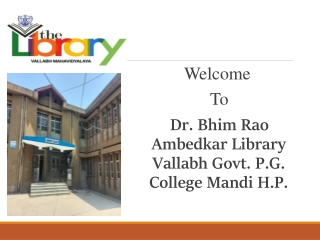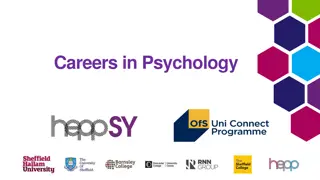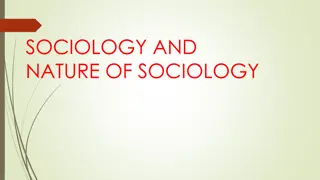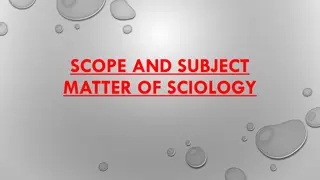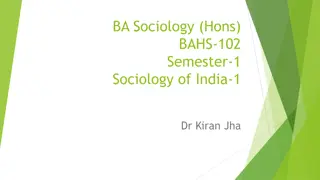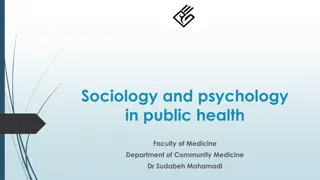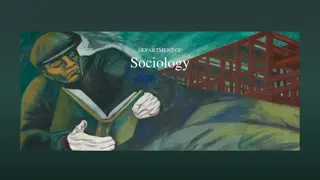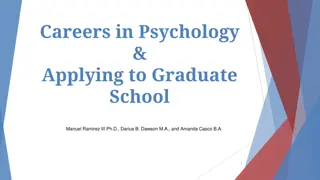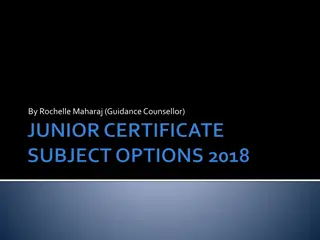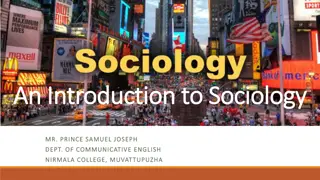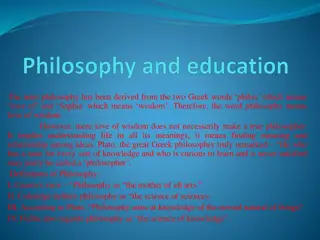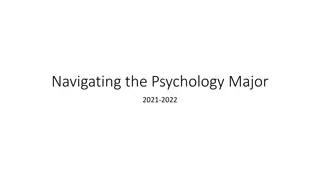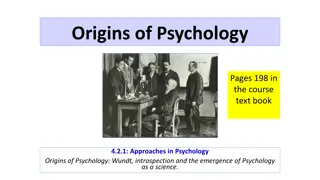Subjects in Focus: Philosophy, Psychology, Education, Sociology, and Library Science
Delve into the realms of knowledge through subjects like Philosophy, Psychology, Education, Sociology, and Library Science, each offering a unique perspective on understanding and dealing with the vast expanse of human knowledge. Philosophy explores truth through Logic, Psychology delves into the human mind, Education shapes learning, Sociology studies societal knowledge, and Library Science organizes information. Discover how these subjects play a crucial role in expanding our understanding of knowledge.
Download Presentation

Please find below an Image/Link to download the presentation.
The content on the website is provided AS IS for your information and personal use only. It may not be sold, licensed, or shared on other websites without obtaining consent from the author. Download presentation by click this link. If you encounter any issues during the download, it is possible that the publisher has removed the file from their server.
E N D
Presentation Transcript
MLISc- Paper I- Universe of Subjects and Research Methodology- lecture-2- SUBJECTS WHICH DEAL WITH KNOWLEDGE AS THEIR FIELD OF STUDY -Dr Sonal Singh drssonal@rediffmail.com
INTRODUCTION Whatever is known to us as human beings is Knowledge. Knowledge is the result of human needs. Knowledge is the creation of human mind. Knowledge is the totality of information. The term Universe of Knowledge comprehends the whole knowledge that emerged in past, present and future. Knowledge is ever growing and infinite. Knowledge is the result of social needs, social pressures and human urges.
SUBJECTS WHICH DEAL WITH KNOWLEDGE For convenience of study, Knowledge is divided into bits which are known as Subjects. Though, every subject is a part of knowledge, yet knowledge as such is not the field of study of many subjects. There are apparently Five subjects which seem to deal with knowledge. These Five subjects are, 1. Philosophy 2. psychology 3. Education 4. sociology and
5. Library Science For, Librarians in general, and for classificationist and classifier in particular, how these subjects deal with knowledge is of importance. We will study each of these Five subjects in detail.
PHILOSOPHY Philosophy is the science of thinking. Thus, the whole knowledge is its domain. Philo means .. Love and Sophie means .. wisdom Means as a whole .. Love for Wisdom So, Philosophy means .. an inquiry into truth . The branches of Philosophy which study knowledge as their field of study are- Logic, Epistemology and Metaphysics.
LOGIC Logic is a branch of Philosophy which deals with systematic study of the general inference. It is the science of reasoning used in the process of building up the universe of knowledge. It is concerned with the process of inference, by which knowledge specially scientific knowledge is attained. All the disciplines of knowledge use argument, at one or other place. In, universe of knowledge, we are, mainly to deal with the knowledge which must be valid, and Logic is concerned with the validity of knowledge. So, logic is an important discipline of subjects which has knowledge in it.
DEFINITION OF LOGIC Logic is a Greek word which means reasons or thought. Thus, Logic is the Science which deals with the reasoning or thinking. It is the science which studies the general principles of valid thought. Thus, logic is concerned with the valid thought and general principles That help us to distinguish valid from invalid thought. The subject matter of logic is inferences and their validity. So, Logic is a systematic science of general conditions of the valid inferences.
LAWS OF THOUGHT An inference is valid when justified. There are certain principles which regulate valid thought and give rise to true belief or knowledge. These principles of validity of inferences are called the laws of thought. The Three Laws of Thought are- 1. Law of identity 2. Law of Contradiction 3. Law of Excluded Middle.
LAW OF IDENTITY It means that a thing is identical with itself. It remains the same amidst of diversity of circumstances. Socrates , the child, the boy, the youth, the old are different and yet it is the same Socrates.
LAW OF CONTRADICTION It means that the two contradictory judgements cannot be true at the same time. For instance, Socrates is old, he cannot be young and old at one and the same time.
LAW OF EXCLUDED MIDDLE It means that Two contradictory prepositions cannot be false together. When one of them is false then other should be true. For example, Socrates is not old then he will be young.
METHODS TO DRAW CONCLUSIONS Logic is the theory of enquiry. It does not accept the primary knowledge received through sense organs. It is concerned with the application of reasoning to primary knowledge. Reasoning is applied and conclusions are derived. These conclusions are logic based. There are Two main methods to draw conclusions. One is from general to particular and other is from particular to general.
DEDUCTIVE LOGIC On the basis of the ways of deriving conclusion, Logic may be divided into Two kinds- 1. Deductive Logic- When we draw conclusions from general to particular, then it is called deductive logic. In this type of logic , the main reason is that whatever is true in all instances of a class must also be true of any single instance that comes within its limits In this method, the truth of a general statement is assumed and a particular conclusion is drawn or deduced from it.
INDUCTIVE LOGIC 2. Inductive Logic- When conclusions are drawn from particular to general then it is called inductive logic. It tries to establish a general proposition, based on the observation of particular instances. Inductive logic is most important in scientific methods.
EPISTEMOLOGY Epistemology is a branch of Philosophy which deals with the question of how we know. Epistemology is a Greek word for Theory of knowledge. Descrate s most distinctive contribution is the turn towards epistemology which he gave to philosophical thought. Descrate approached the question about reality boldly and directly. He described Epistemology as a body of knowledge about knowledge. Today, Epistemology is the most widely accepte subject and asks for an independent status.
METAPHYSICS Metaphysics is a branch of Philosophy which deals with systematic study of the fundamental problems relating to the existence of entities and reduction of their number to a small number of ultimate. It includes the analysis and synthesis of the experience of all the fields of the universe of subjects.
PSYCHOLOGY Psychology is a branch of knowledge which deals particularly with the thinking of human mind. Psychology is the science concerned with human knowledge. It is the science of mental life. It is the science of human behaviour. Why and How people act is studied under this branch. Thus Psychology is a science and practitioners use scientific methods. Another important aspect of psychology as a science is its use of measurement- the assignment of numbers to objects or events according to certain rules.
DEFINITIONS OF PSYCHOLOGY Psychology is defined as the science of behaviour in which mind is not excluded. What a person does his or her behaviour- is the avenue through which internal mental events can be studied. Psychology is concerned with mental processes such as thinking and learning and with mental states such as happiness. As A study of consciousness and behaviour of man, psychology analyses the question what is that in mind which makes to build up the knowledge. It is the science which studies mind and states of consciousness.
EDUCATION Education is the culture which each generation purposely give to those who are to be its successors in order to qualify them for atleast keeping up and if possible for raising the level of improvement which has been attained. Education is a continuous and life long process. It is never remains static. It is an internal process. Whatever a man has learnt , he termed it as education.
DEFINITIONS OF EDUCATION The word Education is derived from a Latin word Educatum which means Learning or Training. Education is an art which helps in physical , mental and moral development of child. It is the process of development by which a human being adopts himself gradually in various ways to his physical, social and spiritual environment. The only proper aim of education is fullness of living through a fully developed character. Education is the backbone of an intellectual society.
SOCIOLOGY Sociology is a combination of two words- 1. Socius which is a Latin word and it means society . 2. Logas which is a Greek word and means study or science. Sociology is the study of society or science of society. Actually it is the scientific study of society about human relationship. It concerns with the relation between knowledge and the essential factors in the society. Sociology in its broadest sense may be said to be the study of interactions and interrelations, their conditions and consequences.
LIBRARY SCIENCE Library Science is a systematic study of libraries where recorded knowledge is acquired, stored, arranged and processed for easier, quicker and better use. For proper organisation of knowledge, librarian should be aware of the structure and development of universe of knowledge so as to provide better arrangement to ever growing universe of knowledge. A librarian is related with proper organisation of universe of knowledge and library services are totally based on systematic and helpful arrangement of Knowledge.
CONCLUSION Every subject studies universe of knowledge from a different angle. Library science is the only subject which bothers about the structure and development of universe of knowledge. With the development of knowledge, library techniques specially the classification schemes must also be revised so as to convert the library collection into useful collection.
THANK YOU drssonal@rediffmail.com


